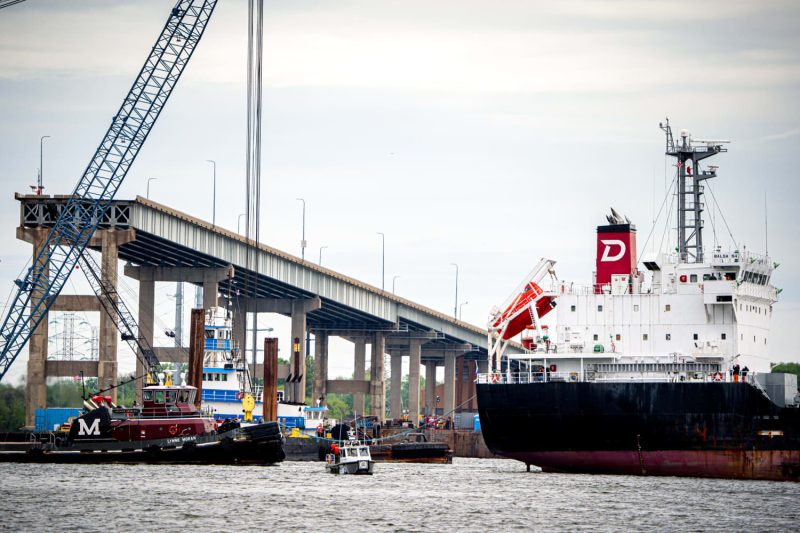
New deep-water channel allows first ship to pass Key Bridge wreckage in Baltimore
BALTIMORE — The first cargo ship passed through a newly opened deep-water channel in Baltimore on Thursday after being stuck in the harbor since the Francis Scott Key Bridge collapsed four weeks ago, halting most maritime traffic through the city’s port.
The Balsa 94, a bulk carrier sailing under a Panama flag, passed through the new 35-foot channel headed for St. John, Canada.
Its voyage marked an important step in the ongoing cleanup and recovery effort as salvage crews have been working around the clock to clear thousands of tons of mangled steel and concrete from the entrance to Baltimore’s harbor.
The ship is one of five stranded vessels expected to pass through the new, temporary channel, including one loaded car carrier. Other ships are scheduled to enter the port, which normally processes more cars and farm equipment than any other in the country.
On Thursday morning, the vessel moved through the channel guided by two tug boats, one in front and one behind. It passed in between red and green buoys marking the channel’s boundaries and glided slowly by the wreckage of the bridge and the grounded Dali, the massive container ship that caused the collapse when it slammed into one of the bridge’s support columns.
Pieces of the fallen bridge are still blocking other parts of the port’s main channel, which has a controlling depth of 50 feet (15 meters), enough to accommodate some of the largest cargo and cruise ships. Officials have prioritized opening a temporary channel deep enough for large commercial vessels to pass through in hopes of easing the economic impacts of the collapse.
The Balsa 94 is expected to arrive in Canada on Monday.
The Dali lost power and veered off course shortly after leaving the Port of Baltimore bound for Sri Lanka last month. Six members of a roadwork crew plunged to their deaths in the collapse. Four bodies have been recovered from the underwater wreckage while two remain missing.
The new channel will remain open until Monday or Tuesday. It will close again until roughly May 10 while crews work to remove steel from the Dali and refloat the ship, which will then be guided back into the port, officials said earlier this week.
The 35-foot depth is a substantial increase over the three other temporary channels established in recent weeks. It puts the cleanup effort slightly ahead of schedule, as officials previously said they hoped to open a channel of that depth by the end of April.
The port’s main channel is set to reopen next month after the ship has been removed. That will essentially restore marine traffic to normal.
In a court filing Monday, Baltimore’s mayor and city council called for the Dali’s owner and manager to be held fully liable for the bridge collapse, which they said could be devastating for the regional economy. They said the port, which was established before the nation’s founding, has long been an economic driver for Baltimore and the surrounding area. Losing the bridge itself has also disrupted a major east coast trucking route.
Officials have established a slew of assistance programs for port workers and others whose jobs are suffering as a result of the collapse.
The filing came in response to an earlier petition on behalf of the two companies asking a court to cap their liability under a pre-Civil War provision of an 1851 maritime law — a routine procedure for such cases. A federal court in Maryland will ultimately decide who’s responsible and how much they owe.
In the meantime, both the FBI and the National Transportation Safety Board are conducting probes to determine what caused the ship to lose power and strike the bridge.
